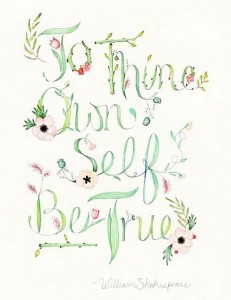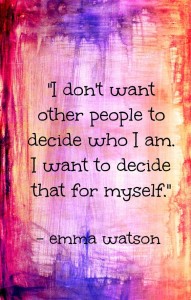To Thine Own Self Be True: How Authentic Are You?
 Act 1, Scene 3, Hamlet, Polonius speaks to his son. These words resonated as I watched an outstanding production of Hamlet at the Stratford Festival last year. They reminded me that in today’s social media environment, it is too easy to pretend to be someone that we are not. However, I was also reminded that in today’s competitive job market, the one thing that we cannot afford to compromise is our AUTHENTICITY.
Act 1, Scene 3, Hamlet, Polonius speaks to his son. These words resonated as I watched an outstanding production of Hamlet at the Stratford Festival last year. They reminded me that in today’s social media environment, it is too easy to pretend to be someone that we are not. However, I was also reminded that in today’s competitive job market, the one thing that we cannot afford to compromise is our AUTHENTICITY.
Recruiters just don’t have time for individuals who are pretending to be someone they are not, and neither do the people in our trusted relationship networks – those important people who helped us get us in front of those important recruiters. When something in the story doesn’t add up, you risk coming across as a fake, and if it’s in that all-important interview situation – when you’ve worked so hard to get there – you just can’t afford to take a chance.
When I checked Wikipedia, I got:
Authenticity concerns the truthfulness of origins, attributes, commitments, sincerity, devotion, and intentions.
When I checked Merriam Webster, I got:
Real or genuine: not copied or false; true and accurate: true to one’s own personality, spirit, or character.
My own personal definition:
The quality of being genuine and sincere.
 Regardless of who we’re in front of, we want to be seen as being consistent, true, real and transparent. Not only does this strengthen relationships we are in, as well as those we are building, it ultimately results in a stronger Personal Brand. But how is this accomplished?
Regardless of who we’re in front of, we want to be seen as being consistent, true, real and transparent. Not only does this strengthen relationships we are in, as well as those we are building, it ultimately results in a stronger Personal Brand. But how is this accomplished?
1. Whether you are speaking or writing, you will appear to be more Authentic if you are consistent in the language you are using. This applies to your online presence as well. If you typically don’t use big words, with elaborate explanations in lengthy sentences in your everyday spoken language, don’t use it in your written copy. If your oral communication style is direct and to the point, carry that through into whatever media you are using to present yourself. It is not Authentic to create one image of yourself on paper and a different one in person. Be Consistent.
2. Facts versus Story. In interviews or networking meetings, your Authenticity will shine through if you tell people what actually happened, not what you think they want to hear. Don’t tell a story that stretches the truth or embellishes the facts because eventually you will be found out. While it is important to be upbeat and positive when presenting yourself to prospective employers, it is very acceptable to talk about challenges that you encountered, struggles you overcame, and difficult situations that you survived. People like to hear about others overcoming diversity. Be Truthful.
3. Nothing makes one more Authentic than openly and honestly sharing feelings. We are, after all, human. Clearly, this doesn’t mean that you break down when relating a sad situation. But it does mean that you comfortably express feelings of frustration, disappointment, joy or excitement when speaking about yourself, your experiences and your background. Generally people will relate to you better, as they can put themselves in the same situation and share the feelings with you. Be Real and Transparent.
You just can’t fake Authenticity. It is easy to smell a phony or a fake when the facts just don’t hang together. And red flags go up quickly about the storyteller and the story being told. However, if you can be your most Authentic self, people will be drawn to you, will trust you, which should increase your chances in the interview process.
Being Authentic also means knowing yourself, faults and all. You need to know who you are before someone else tells you! In a future blog, I’ll discuss how you can discover your True Self through an understanding of your core values. By recognizing and staying true to your Self – no matter the situation – you embrace your identity and your individuality!

